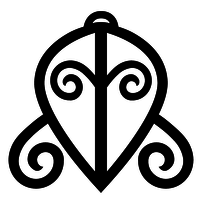Odo Nnyew Fie Kwan (Odo Nyera Fie Kwan)

How to pronounce Odo Nyera Fie Kwan
The meaning and philosophical significance of Odo Nnyew Fie Kwan
Odo Nnyew Fie Kwan means “Love does not lose its way home.”
Those led by love always end up in the right place.
“Odo nnyew fie kwan” which is the Fante rendering of the name while “Odo nyera fie kwan” is the Asante and Akuapem version means “Love does not lose its way home.” That means love always ends up where it is supposed to be.
Love, in its various shades and colors is a central theme in all relationships. Without it, relationships can hardly survive, not to talk of thriving. Being a polygamous society, the Akans recognize and celebrate erotic love between men and women.
The idea that one is certain to arrive at a desired end if his motives are pure is embedded in this phrase. One may not know exactly what steps to take to reach the final destination. He may not even know what a good final destination is, however, if he is dedicated to love and is optimistic in his outlook that something positive and beneficial can be derived, it is certain that a desirable result will be achieved.
This should not be an excuse for indolence, inertia, and inaction regarding the pursuit of worthy causes. The tendency of the universe towards positive outcomes in the presence of painstaking effort is itself a belief that warrants explication for it is not obvious why that should be the case. Therefore, a cynic would be justified, upon questioning the basis of such a belief, but we must begin from somewhere and a basis such as this is sufficient for making initial progress.
The symbol exhibits bilateral symmetry with each half spotting two spirals. Just as the spirals in the alternative Sankofa symbol signified a return, the spirals here probably also do the same.
As the Good Book says, “Love never fails.” There are a variety of forces by which the world operates and by which its institutions and systems are held together. Knowledge has a role to play, hope has a role to play, faith has a role to play, but love also has a role to play and the notion that it is indispensable and superior to all the other virtues and principles is captured by this symbol.
Akan proverbs about love
1. Odo ye owu
Literally: Love is death.
Alternatively, this may be interpreted as “Love is unto death.”
To love someone is to be prepared to die for the person. This fits perfectly with the Christian idea that there is no greater love than for a man to lay down his life for his friends.
In marriage, odo ye owu could mean that marriage is for life and that only death is permitted to separate the lovers.
Some people call their lovers odo ye owu to signify that they truly love them and, perhaps, are prepared to go to any length for their sake.
2. Nsuo a edo wo na eko w’ahina mu
Literally: It is the water (river) that loves you that enters your pot.
This may refer to water entering into a pot when one uses it to fetch water from a river or stream. Presumably, if the water does not love you it will not enter your pot.
In reference to lovers, this could mean that if someone loves you he would propose to you or that if someone loves you he will come to you or be involved in your affairs.
3. Obaa do wo a na obo wo ka
Literally: It is when a woman loves you that she spends your money.
Though it may be painful to have your money spent by another, it may be a sign of love for somebody to bother you in this fashion. A woman who does not love you does not want to have anything to do with you, not to talk of spending your money so you feel she has somehow committed herself to a relationship. In this regard, the proverb is similar to the saying that “Se Nyame do wo a na oso wo hwe,” literally, “It is when God loves you that he tests you.” Yes, testing may be difficult, but God does not bother to test those he doesn’t care about.
4. Obi do wo a na oba wo fie
Literally: It is when somebody loves you that he comes to your house.
5. Other sayings on love and marriage
- Woreko awaree a bisa
- Awaree nye nsafufuo na yeaso ahwe
- Awaree kwan ware
- Oyere te se kuntu: wode kata wo ho a na wo ho keka wo; se woyi gu ho nso a na awo de wo